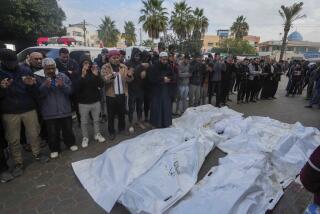Phnom Penh Proposes a 40% Troop Cut : Cambodia: The other 60% would be put under U.N. supervision. Four factions meet today in bid to settle lengthy civil war.
- Share via
PATTAYA, Thailand — With hopes rising for a quick settlement in Cambodia’s long-running civil war, the Phnom Penh government offered Sunday to dismantle 40% of its army and place the remainder under U.N. supervision.
The proposal came as the leaders of Cambodia’s four factions gathered in this Thai beach resort for a meeting starting today of the Supreme National Council, an interim governing body that since June has been moving rapidly toward a resolution of the conflict.
The council, a kind of “super government” composed of six members from the Phnom Penh government and six from the guerrilla factions, is meeting to discuss a detailed peace proposal by the five permanent members of the U.N. Security Council--the United States, the Soviet Union, China, Britain and France.
In a meeting here in June, the council agreed on a cease-fire and a halt to arms supplies from abroad. In Beijing last month, the group chose Prince Norodom Sihanouk, who was deposed as Cambodia’s leader in 1970, as chairman of the group.
But initial agreement was achieved by postponing consideration of the genuinely contentious issues contained in the draft agreement released last November by the Security Council’s five permanent members.
The first issue in dispute is disarming of the four factions’ armies after a peace agreement is signed. The U.N. plan called for all four parties to disarm and surrender their arms to U.N. monitoring troops. The Phnom Penh government has refused to consider this provision, arguing that the notorious Khmer Rouge guerrilla army has huge caches of weapons concealed in the jungle and might return Cambodia to the “killing fields” it created in the 1970s.
The other two guerrilla groups are Prince Sihanouk’s followers and the Khmer People’s National Liberation Front.
There is another major disagreement over sovereignty, because the U.N. draft speaks of placing key Cambodian government ministries directly under U.N. control.
Phnom Penh’s Premier Hun Sen told a hastily convened press conference here Sunday night that while his government is prepared to compromise, it will never agree to total disarmament.
He offered to demobilize 40% of the government’s armed forces and place the remaining 60% in special camps under U.N. “supervision.”
The proposal falls well short of demands by the Khmer Rouge for total disarmament and U.N. control of weapons, as spelled out in the U.N. draft agreement.
“In a country such as Cambodia, which has been victim of a savage war for a long 13 years, even a civilian police force with light weapons is a repressive force, as they could take revenge on those who have been disarmed and unarmed,” the Khmer Rouge radio said in a commentary broadcast last week.
But the radio said the U.N. draft could be “discussed, completed or amended,” without giving details of the Khmer Rouge’s compromise position.
A compromise appeared to have been reached in which Phnom Penh would drop its demands for a clause in the peace agreement condemning past genocide; the Khmer Rouge has refused to sign a document with any reference to genocide. Genocide is an international war crime banned by U.N. convention, and there was concern in the Khmer Rouge that its leaders would be tried for war crimes after returning to the country in a peace settlement.
The mood of optimism surrounding the talks also stems from a recent warming of relations between China and Vietnam.
Western diplomats said they believe that China and Vietnam, both still orthodox Communist states, are so concerned about the blossoming of democratic movements in the Soviet Union that they have agreed to put aside past differences and cooperate--and that this includes the Cambodia peace talks.
“I am optimistic that some progress will be reached because everyone is prepared to compromise,” Hun Sen told journalists in Bangkok earlier in the day.
Both the Khmer Rouge and Prince Sihanouk have called on the United Nations to quickly dispatch between 200 and 700 troops to Cambodia to monitor the current cease-fire.
More to Read
Sign up for Essential California
The most important California stories and recommendations in your inbox every morning.
You may occasionally receive promotional content from the Los Angeles Times.













